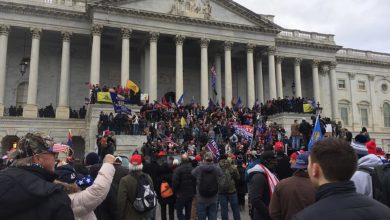On Friday, November 23, the United Nations passed a resolution condemning Nazism and similar tendencies. The resolution, proposed by Russia at the UN General Assembly, cites the increase in racism-driven hate crimes around the world as its motivation.
The text of the resolution denounces all Nazi and similar ideology and any attempts to laud Nazi collaborators by calling them national resistance fighters — a frequently observable tendency in Europe as of late. The resolution also condemns the denial of Nazi war crimes, such as the Holocaust.
It may come as a surprise to some that the United States, a country whose history books like to emphasize its role in the struggle against Nazis during World War II, was one of three countries that voted against the resolution. The other two dissenting countries, Canada and Ukraine, are also not countries most people would associate with supporting fascism.
These three votes may be insignificant in the passing of the resolution itself, which was supported by 115 other countries — Germany included. However, they are extremely significant in shedding light on the character of U.S. interests, and how far the United States and its allies are willing to go to preserve those interests.
Digging just a bit deeper into U.S. history and current policies, both domestically and internationally, the vote becomes less surprising. The strategic decision to enter WWII and incidentally fight the Nazis was largely an outlier in U.S. history. In fact, the decision to become involved in WWII was not motivated by an ideological opposition to fascism — rather, the U.S. stepped in when it became clear that the country’s economic stability and dominance in the world would be determined by whether the U.S. became involved and was able to reap the spoils of victory in the war.
Racial oppression, capitalism and imperialism — core tenets of fascism — have always been integral parts of the U.S. structure and path to domination. The U.S. has a long history of installing and supporting extreme right-wing dictatorships around the world. Racism, a pestilence that was and remains in existence throughout the world, was taken to a new level in the United States, which survived and rose to power through an economy built on genocide, slave labor and national oppression. Groups like the KKK have enjoyed special privileges in the United States since their inception.
In comparison to progressive and left-wing organizations, the Klan and other extreme right-wing groups are viewed as less of a threat, even when they are actively in the streets. This is exemplified most recently by the polar opposite reactions by Ferguson law enforcement to peaceful marches by protesters and marches conducted by the Klan (which threatened violence).
Marches in solidarity with Mike Brown and the Black community are met by police with guns at the ready and armed to the teeth in riot gear, while Klan actions are accompanied by a few cruisers that the cops never leave and are explicitly there to “protect” the Klansmen. The chant “Cops and Klan go hand-in-hand” is no exaggeration.
U.S.-backed fascism in Ukraine
The Russian Foreign Ministry’s statement says: “Ukraine’s position is particularly dispiriting and alarming. One can hardly understand how a country, the people of which suffered their full share of the horrors of Nazism and contributed significantly to our common victory against it, can vote against a resolution condemning its glorification.”
Ukraine indeed suffered an extremely brutal assault by Nazi forces during WWII — over 7 million casualties in the military alone, and a very vicious dual targeting of “undesirable” racial groups and progressives. The Ukrainian people also had a key role in the turning of the tide against the Nazi forces and the victory of the USSR over the Nazis on the East Front.
It was not only the Red Army — civilians from small villages put their forces together to defeat fascism.
Contrary to the narrative of U.S. history books, it was the USSR’s victory on the East Front that secured Hitler’s defeat. It was the Red Army forces that liberated the largest, most deadly camps. Moreover, U.S. intelligence had information on the location of Hitler’s death camps well before it entered the war. It chose not to act then, instead waiting for a time when the military would suffer the smallest number of casualties and the spoils of victory were the most secure. The people of the USSR did not have a choice — Hitler was on their doorstep, they fought back valiantly and won.
However, much has changed since the fall of the USSR. Ukraine, like many other nations, has undergone a period of reactionary transformation. A symptom in all former USSR countries, racism and nationalism have become flagrant in Ukraine. Because the fall of the USSR meant a swift change in policy, the stealing of nationalized resources by private individuals and squashing of people’s economic rights, nationalism became a sort of compensation for the real rights that people lost. In several countries, including Ukraine, the new corrupt governments encouraged nationalism and praised the “freedom” gained after the fall of the Soviet Union — all the while lining their pockets with resources that used to belong to the people.
In November of 2013, the Euromaidan movement sprang up in Ukraine against their elected government, with demands for Ukraine to join the European Union and eventually for president Yanukovych to resign. The movement was overwhelmingly a nationalist one, with many lead elements coming from openly white supremacist, neo-Nazi organizations. These Nazi extremist elements gained a great deal of power in the movement, with their racist, anti-Russian leaders rising to formal governmental power after the ousting of Yanukovych.
The United States supported the Euromaidan movement from its inception because Yanukovych’s economic policies were not entirely complicit with US business interests. Despite the fact that the movement and its leaders included some openly fascist elements, the United States government has been extremely vocal about their political and economic support for Ukraine. As a result of the victory of the “uprising”, Ukraine’s new government quickly signed a $10 billion shale gas deal with U.S. oil giant Chevron.
It is no surprise that the two countries blocked together against the anti-fascism resolution.
Not in our name!
The popularization of nationalism, racism and fascism is not an amorphous theoretical trend. On the anniversary of the USSR’s victory against Nazi Germany, neo-Nazis in Ukraine set a bus full of WWII veterans on fire, murdering them. The same fascists set a union building ablaze and sang Nazi songs as the workers inside burned alive. But none of these horrors matter to the United States government and corporations, which see Ukraine as a strategic geopolitical point to control and and an excellent source of income.
Hiding behind the lofty US slogans of “democracy for the people of Ukraine” is a ruthless imperialist supporter of a racist, anti-Russian and deeply reactionary “movement.” In blocking with Ukraine against anti-Nazism, the United States writes off the murders of countless Eastern Ukrainians by their own government as acceptable collateral damage on a path to a more easily controllable Ukraine.
In a time when pro-Nazi sentiments are regaining popularity throughout Europe, and the United States is rife with racist murders, it is crucial that all progressive people expose the United States for what it is — not a country that emerged victorious against fascism, but a country that will support the most backwards, murderous ideologies in pursuit of global hegemony. It is our duty to fight back against such a system and say no to fascism. Not in our name!






